#Tyres Fenton
Text
The key context of the word I coined in 2008 is that mansplaining is one part of a huge problem – of who gets listened to, and who gets believed
by Rebecca Solnit
Ihave a file on my desktop titled Mansplaining Olympic Tryouts, mostly screenshots of some of the most epic specimens I’ve come across on social media or that people have steered my way. They’re grimly hilarious: a man explaining vaginas to a noted female gynaecologist, a man telling Sinn Féin adviser Siobhán Fenton to read the Good Friday agreement (she replied with a picture of herself with the book she wrote on that agreement), and the famous incident with Dr Jessica McCarty, about which she tweeted: “At a Nasa Earth meeting 10 years ago, a white male postdoc interrupted me to tell me that I don’t understand human drivers of fire, that I def needed to read McCarty et al. I looked him in the eye, pulled my long hair back so he could read my name tag. ‘I’m McCarty et al.’”
The word mansplaining was coined by an anonymous person in response to my 2008 essay Men Explain Things to Me and has had a lively time of it ever since. It was a New York Times word of the year in 2010, and entered the Oxford English Dictionary in 2018; versions of it exist in many other languages from French to Icelandic, and the essay itself has appeared in many languages including Korean and Swedish. People often recount the opening incident in that almost 15-year-old essay, in which a man explained a book to me, too busy holding forth to notice that I was its author, as my friend was trying to tell him.
But pretty briskly the essay moved from the amusing to the terrifying: I then recounted an incident in which a middle-aged man explained to a very young me, chuckling, that when his neighbour ran out of the house naked in the middle of the night screaming that her husband was trying to kill her, he was confident that she was crazy and her husband was not murderous, simply because of his assumptions about gender.
Here’s what almost everyone seems to miss about mansplaining, including those doing the formal studies as well as the people telling the funny stories. It’s one corner of a colossal problem, in which biases, statuses and assumptions warp everyday life and allocate more credibility, audibility and consequence to some people than others. All this creates what I think of as inequality of voice. Whether you’re trying to convince doctors that your pain is real or neighbours that your husband is trying to kill you, it can be a life-or-death issue. It matters in offices, classrooms, conferences, boardrooms, in hospitals, on the street, in bedrooms and at dinner tables.
One high-profile recent incident of people who assumed they had the authority to control the narrative came with the police murder of Tyre Nichols, one of many incidents in recent years where video told a very different story to the one told by the police. Somehow they seem to assume that they have the impunity that comes with controlling the narrative, which in cases like this mean literally expecting to get away with murder. Inequality of voice is one of the most powerful elements of inequality of all kinds. Children and elderly people are routinely treated as incompetent witnesses to their own lives and needs. Poor people, immigrants and people with disabilities are likewise treated as subordinates and incompetents.
Non-white people are too often assumed to be less trustworthy, less qualified to speak and act in many kinds of situation, and – to state the obvious – too often regarded as criminal simply on the basis of colour.
There are a lot of stories about people of colour being assumed to have stolen the vehicles they drive or be the servants at posh gatherings; I’ve heard from some of the latter first-hand. There have been many studies about how often women and people of colour are ignored or disbelieved when they report pain, sickness and injury, and how that impacts health outcomes. Black women in the US have a disproportionate incidence of dangerous medical experiences related to pregnancy and birth because of unequal access to care – and to credibility. Even tennis star Serena Williams was at first dismissed when she reported a postpartum pulmonary embolism.
People have also tried to render the word gender-neutral, which would make it meaningless. We have lots of other words – arrogant wanker, patronising idiot, Dunning-Kruger prize winner, for example – for acts of misplaced condescension. But reducing the issue to incidents of being merely patronised in conversational exchanges misses what matters. A phrase I often use is “dosage is cumulative”. If you spend your life being assumed to be less competent, less qualified to speak and less worthy of being listened to, more likely to be mocked, ignored or insulted, it inhibits your willingness to speak up and participate. So it’s not just what happens in the moment that matters, but how it shapes how we perceive ourselves and others in the long run.
The credibility gap turns into a hugely harmful thing with sexual assault and gender violence, in which men have historically been believed over women. It often brings on victims’ despair about reporting such abuse, because if you will not be believed, and if you will be mocked, shamed, harassed or even criminalised for reporting abuse, why would you bother? Almost all sexual abuse involves a perpetrator with higher social status, and a big part of that status is the ability to control the story and suppress other versions. It’s what serial rapists like Harvey Weinstein and serial child molesters like gymnastics doctor Larry Nassar relied upon during decades-long criminal careers. Inequality of voice isn’t just what happens after such crimes; it’s too often what perpetrators count upon beforehand.
It’s great that the word mansplaining exists, along with spin-offs such as whitesplaining and westsplaining (the latter for North Americans and western Europeans explaining the invasion of Ukraine and eastern European politics with narratives centred on our political histories rather than theirs). But everything loses meaning when it loses context. Mansplaining’s meaning requires the broader context of intersecting inequalities and assumptions that play out in everyday life, with consequences that are occasionally amusing but too often nightmarish. My goal always was to advocate for a democracy of voice, for equality in who gets to speak, who’s heard, and who’s believed and respected when they speak, across all categories.
10 notes
·
View notes
Text
Disagreeing and The Spirit
When I went to seminary in the mid-to-late 1980’s, there was no class in conflict management. I am surprised because it is no secret that congregations have conflicts. Any time you have two breathing people in the same room for some period of time there will eventually be conflict. I truly hope that conflict management is part of the seminary curriculum today.
Conflicts in churches are nothing new. The early church, as described by Luke in his book we call “Acts”, describes several conflicts in the early church. This really shouldn’t be a surprise either; the infant church was on a learning curve that has lasted two millennia. The interesting thing about how the early church resolved their conflicts is that no two conflicts were settled in the exact same way. There was no one-formula-fits-all way of settling the disputes. What the early church DID try to do was discern what God was doing. And, after the dust had settled, sometimes everyone agreed and sometimes they did not.
There was one conflict, seemingly minor, that happens in Acts upon which I want to invite us to reflect. It happens in Acts 21:1-6. Paul is one his way to Jerusalem, convinced that the Holy Spirit is sending him there to further his mission – though he knows this will likely lead to his death. His boat docks in Tyre, a large city on the coast of the Mediterranean. While he is there, he meets with the church there. They know what Paul is doing and they urge him to not go to Jerusalem. Luke writes, “Through the Spirit they told Paul not to go.” (Acts 21:4, italics mine)
Through the Spirit – the same Holy Spirit Paul was convinced told him to go to Jerusalem. Is someone not hearing the Spirit? Are they both hearing the Spirit? Can both be right?
I don’t want to make too much of this, except to say that both parties were trying to listen to and obey the same Holy Spirit. Though they come at it from different perspective and different interpretations of the Spirit’s guidance, both parties arrived at their conclusions in good faith. There is no name-calling. No demonizing the other. No one accusing the other of heresy or disobedience. What they do is, when Paul’s ship is ready to set sail, there are hugs and they “knelt down on the beach and prayed.” (Acts 21:6)
Fenton United Methodist Church will soon come to a crossroads where we will decide our future to either remain United Methodist or disaffiliate from the United Methodist Church and join the Global Methodist Church. I am glad that our conversations have been respectful and gracious even as we disagree with each other. I believe that each of us has come to our convictions in good faith, even though it is the same God and the same Scripture that has guided us. We have asked ourselves, “Who are we as a church and who do we believe God wants us to be?” I am glad that we have been more interested in kneeling in prayer with and for one another on the beach rather than trying to dominate one another with vitriol and vilification. May we be an inspiration to the churches around us on how to love one another in the midst of disagreement.
We are in our forty days of prayer in regards to our decision. Let us pray for God’s guidance. For wisdom and discernment. Let us pray for a spirit of love, peace and respect. And, when we have made our decision, let us kneel with one another and pray.
And as always, I am proud to be…
With you on the journey,
Jeffrey L Jaggers
Pastor
4 notes
·
View notes
Note
9, 14, 25-- Christian
@christian-fenton
∗ o9﹕ a text containing a confession .
Text: You know, you’re not as bad as I initially thought. You’re actually decent. And don’t get all cocky about it. I will deny it to anyone you ever try to tell but that’s the truth. You’re the first decent guy I’ve met in a long while. Might even be one of the first decent human beings that I’ve met for a long time.
∗ 14﹕ a text sent while half asleep .
Text: You really scared me tonight, you know? I’m just glad your okay but I can’t stop thinking about it.
∗ 25﹕ an urgent text
Text: Christian, my tyre has gone flat and it’s raining really hard and I’m pretty sure there’s this homeless guy who keeps on staring at me and help!!! I’m locking myself in my car. Come and save me before I die, pleaseeeeee!!!
Text: God. I even said please. Hurry up.
1 note
·
View note
Text
List of Headmates (fictives and others):

We’d love to meet anyone from any of these sources, but the body is 21 and we’d prefer to talk to people 16+. Please check the notes to see actual Canon Calls lists/links, as well as dream canonmates to find.
We are friendly to all systems and kins interacting.
* next to most frequent fronters as of last edit date

BNHA
(Heros)
Hawks ⭐️
Aizawa
Oboro
(Students)
Shoto (mostly dormant)
Ochako
Hagakure (goes by Peri)
Kaminari
Kami ⭐️
Denki
Bakugo
Wolf Bakugo
Baku
Katsuki (yes we have a council of bakugos)
Izuku
‘Zawa
Momo (short term)
(Villains)
Shigaraki
Toga
Twice
Kurogiri
Mina/Ashido (stopped IDing with normal tl, only villain lately)
Kins Harley Quinn
(Other)
Natsuo
Fuyumi
Eri
Possibly: Aoyama, Rei?
(Technically these we dont know if theyre fictives or not)
Aro/Sero
Bishop/Kouten (OC) , (kinned, now has a subsystem: bakugo, dabi, kouten)
Kiri (derogatory) - technically this one is an abuser introject who kinned kiri
(Kinnies)
Sho (Shinsou, Shigaraki, Denki)

Haikyuu!!
Kenma
Hinata
Sparrow/Suga (Jikukawa from phi brain too)
Suga (transfem)
Daichi
Tsukki
Oikawa
Nishinoya (semi dormant)
Hima (oc)
Anais/Willow (Oikawa, dance au, Eurydice from hadestown)
Possibly:
Kiyoko, kageyama

Danganronpa
Komaeda (derogatory) - goes dangerously manic (dormant)
Naegi *

Comics (DC/Marvel)
Peter Parker (mostly dc universe, not marvel) ⭐️
2 unknown speedsters, appear to be non canon, “children” of Barry/Iris, assume adopted *
Bart/Wally , Owen???? theres 2 we cant tell
Lorna Dane-Summers ⭐️
Freddy Freeman
Billy Batson
?Cleo?
?Raven?

Other Fictives
Eurydice (hadestown) *
Wisty (witch and wizard) *
Will Solace (percy jackson- pjato, not hoo or toa) *
Nico??
Danny Fenton/Phantom
Hani
Dirk ⭐️
Dave
Apollo

Non-Fictives
Alex : Host , can’t leave front ⭐️
kins: Harley Quinn, Evie, Kitty, ?Ty Lee?, Fuyumi, Tohru Honda, Hadestown (all of it), some1 from waitress, Amélie (title name character, musical), Julietta, Mirabel, Isabela, Dolores, Random Villager #4, ???

(Kinnies/*Can’t Tell if Fictive)
Carter (Peter Parker)
Jeremy* (Jeremy Heere)
kins a stoat
?Nagisa? (Assassination Classroom)
Other Alters
Mode
Mega (non human) ⭐️
Unknown little
(Dormant atm)
Ana
Raven
Has wings
Grey
Rook
Pop-prinxe
Carebear
Parker
Olive (fictive from 25th annual putnam county spelling bee)
lulu (little, bishop and grey’s adopted kid)
Hani? (unsure if formed, from Ouran Highschool Host Club)
Dabi (*Introjected rl ex-boyfriend of hawks)
Cecil (wtnv)
Tyre
Lilith
Caleb
Bo

Other (Manifesting)
Spencer Reid
Sherb
Allison Hargreeves
🌱
Nathaniel/Marc??
powder/jinx
newt scamander
Kai Bartley
???

*Images are simple rainbow gradient linebreaks for better legibility
#bnha fictive#haikyuu fictive#mha fictive#my hero academia fictive#fictive#Posted: 8 Feb 2021#Last Edit:#12 Nov 2021
21 notes
·
View notes
Text
College Blues - Chapter 2
Here it is. Grammar checked 4 times but probably still hiding some errors <3 This chapter turned out longer than the first, so I’m glad.
Themes: Tired Student Vibes - Uni is hard ok? - Angst - Family
Synopsis: With only 3 months left of their first year attending University, Danny and Sam decided to take a trip back down to Amity Park to visit family for a week to take the edge off. It soon becomes clear that visiting home was something Danny desperately needed.
Word Count: 1482
-----------------------------------------------------------------------------------------------------
06:00 << Guess who brought a load of snacks for the trip 🍫🍿 >>
06:15 << Remember the train leaves at eight >>
06:30 << U alive? And if u reply with no I swear… 😂 >>
07:30 << Danny? >>
Sam sat there, thinking of what to type next. She didn’t like to pester but considering Danny hadn’t even looked at his phone for this long, giving him another poke seemed more than reasonable. Sam knew how assertive she could be towards both Danny and Tucker at times. It was normal for both of them to leave things until the last minute. But after checking in with Tucker to see if he’d received any replies, Sam was half-tempted to head round to Danny’s dorm and spam the buzzer until he responded. No, that’s too far. They weren’t kids anymore. She should’ve tried to call him instead. Why didn’t she think to do that earlier? Ping. A new message.
07:35 << Sorry, yeah dw im on my way >>
Typical, she thought. It was a little rude that Danny didn’t even think to give a reply sooner than 25 minutes before their train was due to arrive. At the thought of this, Sam began jabbing at her phone, crafting he perfect response to convey her annoyance. What happened next caught her completely off guard. It was silent, but the action of Danny swiftly phasing through the wall behind her was enough to cause Sam to jump up from the bench.
“Shit Danny, do you even use doors anymore?”
“Sorry I was… I was in a bit of a rush. Didn’t have time to, you know, take the long way here.”
Furrowing her brows, Sam opened her mouth, ready to lecture Danny that if he had only gotten up earlier then he wouldn’t need to rush. But she paused, taking in her friend’s face. Danny looked… awful. His normally brightly lit blue eyes were dull with fatigue. It was almost as if he had just rolled out of bed. Considering the chances of a late-night ghost encounter, she chose to let it slide.
“You look...” She begun.
“-Like crap? Yeah I know.” He’d moved to slide off his backpack and sit down on the bench. “Was it a ghost? You could’ve woken me up you know. I don’t mind.” He shook his head, slumping forwards to rest his elbows on his knees. “No, just got distracted with other things.” Probably playing the new video game that he and Tucker had been raving about for the past week, Sam had figured. Now that Danny had eventually turned up, they had around 20 minutes to spare. After grabbing some coffees from the platform over, they returned to the bench and continued conversation. As they spoke, Sam continued to take in the state of her friend. His hair was slightly unkempt, and she was surprised to see that he had only brought a small singular backpack along. Though this made sense due to how much time he had given himself to pack. “I really am sorry by the way, I completely lost track of the clock.” He repeated for what must have been the third time. Finishing what was left of her drink, Sam gave a small laugh and looked back up. “Nah it’s fine. You wouldn’t be you if you didn’t lose track this often, right? I’m just glad you’re alive.”
“Debatable.” He smirked. She practically walked into that one. Ghost jokes were their only source of humour at this point, and the boys would take any chance they got to use them. After a few more minutes of back and forth banter the train finally arrived and the journey commenced. Amity park was a good two hours and thirty minutes away. This made food a must, and as promised, Sam had brought a selection of treats for them both to snack on. “Oh, I actually already ate.” Danny shrugged sheepishly looking down at the pile of treats that had been laid out between them. “But you said you didn’t have time to get anything this morning?” Did he say that? He played back their previous conversation from the platform. He must have done because Sam was right. He took a second to think of an appropriate response “Oh, I meant that I had something on the way over. Good thing I had time, right?”
Things were not adding up at this point. Sam wasn’t stupid and she could tell when she was being lied to. But what he was lying about was still unclear. Was it that he disliked what she had brought? No, that couldn’t be it. Sam had made sure to include things that he liked as well as the usual vegan variations for herself. Maybe he felt unwell? She looked over at Danny, who was gently resting against the train’s window, staring unfocused at the passing scenery. He didn’t look much better than he had around 10 minutes ago. Danny never really liked to let his guard down, especially since being outed as Phantom. While this made sense, it irked Sam when Danny refused to come forward about anything. “Hey, you alright? We could crack open the window if you want.” She motioned, giving him a light nudge. Jolted back into reality, Danny wearily lifted his head. “Huh? Yeah that’d be nice. Could do with some fresh air in here.” That was good, she hadn’t expected him to comply so easily. Getting up, Sam reached overhead and pushed the window latch open. “What do you think is up? Could it be your ice core?”
Danny shook his head. “I doubt it. I haven’t had issues with my ice core in years now. It’s probably just a lack of sleep. It’ll be fine.” There it was. It was this kind of dismissiveness that became so irritating to put up with. It made Sam want to retort back in defiance, but that wouldn’t be fair. It was best to assert herself without causing any more stress than there likely already was. But what else would work other than to push a little further? “Come on, at least drink some water.” She’d insist, offering him one of the many water-bottles she brought. After slight hesitation, Danny accepted the bottle and moved away from the window. He didn’t drink much from it, but it was something.
While most of the snacks remained untouched, the rest of the journey was well spent as the two continued to reminisce over the new ghosts they encountered over the course of the year, and how less manageable they were compared to the ghosts of Amity, which was saying a lot. They discussed what they would do once they got back. While meeting with Tucker at the Nasty Burger was on the agenda for tomorrow, today would be spent settling into their homes and catching up with family. When Danny had notified Jazz that he would be visiting for the week, she was more than happy to travel back down herself. While small, the Fenton family were close. To their parents, it wouldn’t feel the same if only one of them visited at a time. With this in mind, Jazz had insisted that her little brother mention if he were to come down so they could plan accordingly. Familiar buildings could now be seen through the window, indicating that they had reached Amity Park. The two gathered their bags and prepared to leave the train.
“Let me know when you touch base.” Sam said, giving him a quick hug as her parents pulled over to the side of the road. Danny gave an affirmative nod, returning the hug and stepping back. The two waved to each other as the vehicle turned a corner and out of sight. Now it was just him. Five minutes or so had gone by when the phone in his pocket began to buzz. Once again being brought back into the land of the living, Danny hastily grabbed the phone and slid it right to answer. “Hello?”
“Danny-o! Just calling to let you know we’re almost there! Did you arrive safely?” The screeching of car tyres through the other end of the phone were grating to listen to. “Uh, y-yeah, Dad. I’m waiting outside…” The blaring of a passing car horn caused Danny to move the phone away from his ear. “Remember to watch the road, Jack.” Maddie chimed in from the passenger seat. They were definitely close, as the same sound of the car horn was heard from a few blocks down. As if on cue, the all too familiar Fenton Family Ghost Assault Vehicle slide into view. It was a miracle that the tires were able to withstand the backlash as the vehicle came to a sudden halt. Rolling down the window, Jack beamed at his son.
“There he is. Our favourite ghost boy!”
#Phiccs#Danny Phantom#Sam Manson#Danny Fenton#Danny Phantom Fanfiction#Hhhhhcollegesucks#Fanfiction#Fenton Family
13 notes
·
View notes
Text
Road Hero Space Saver Spare Wheel Now Available
08, January 2018: Ultimate Alloy Wheels has recently added the new Road Hero - Space Saver Spare Wheel Kit to their inventory. The Road Hero kit is an all-in-one spare wheel kit that includes everything a driver would need to replace a wheel on the roadside with ease. It has been designed with convenience in mind to ensure continuity when drivers experience a puncture, blowout or wheel damage whilst on the road. The kit contains all of the essentials and the package can be customised to suit the user’s car make and model. The Road Hero currently supports most major and popular car makes and models.
The Road Hero kit includes a lifting jack to raise the vehicle, a wheel brace to remove the wheel nuts and a spare wheel with a tyre. The set also includes a bag to store all of the items and to keep it in a convenient package. Ultimate Alloy Wheels includes options for the buyer to choose the make, model, year, tyre size and wheel tyre. This is to ensure that the wheel provided in the Road Hero kit is compatible with the buyer’s vehicle. Prices range from £141.60 to £283.20 depending on the requested wheel and tyre.
With treacherous conditions on some of the roads in the UK, tyre damage from potholes and other obstructions is more common than most people would assume. This can seriously hinder one’s ability to drive and relying on traditional breakdown coverage can cost valuable time and money. This makes the Road Hero a must for drivers of all levels and experience.
“Don't get caught out on the side of the road in the rain only to find out you don't have a spare wheel as many new cars now do not have one.” Ultimate Wheels LTD
The Road Hero kit can be bought directly from Ultimate Alloy Wheels with free shipping to most UK postcodes, otherwise, there is a £20 or £30 charge depending on the location. All packages are aimed to be dispatched on the same day if ordered by 2pm (12pm on Friday). Orders received after will be dispatched the next working day.
About Ultimate Alloy Wheels:
Ultimate Alloy Wheels Ltd is an alloy wheel provider that is focused on providing a high level of customer satisfaction and support. They boast extensive knowledge on wheels and tyres and are open to offering advice to customers. In addition to offering the Road Hero kit, Ultimate Alloy Wheels offers a wide variety of wheel styles to choose from. For more information, please use the contact information below to get in touch.
For Media Contact:
Company: Ultimate Wheels Ltd
Address: Southfens Business Centre, Fenton Way,
Chatteris, PE16 6TT, England
Phone: 01945 700459
Email: [email protected]
Website: http://ultimatealloywheels.co.uk/wheel-brands/uncategorized/road-hero-space-saver-wheel-kit/
0 notes
Text
Unit 5 Contextual Studies
Part One: War Photography
The first record of war photography that I have managed to source was the aftermath of the 1847 Mexican – American War by an unknown photographer.
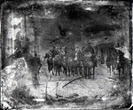
In the Crimean War in 1853 one of the first War Photographers was called Roger Fenton. He could not capture images of moving subjects at that time as the technology didn’t exist to capture motion without motion blur. They had no choice but to make the subjects stand still for a long time so could only catch the aftermath of the war or staged shots. Another pioneer of photography is a man called Thomas C. Roche who shot the aftermath of the 1861-1865 American Civil war.
The aims of War photography is to show the world what war is really like and the aftermath that it leaves. This is to help people understand what effect war has on the world and the personnel involved. Originally the shots were propaganda, either staged battle aftermaths or portraits of brave soldiers. They were instructed not to show suffering or death within the image. In modern times with much improved technology and techniques war photography tries to capture the reality of the moment and the true horrors involved.
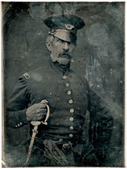
I learnt from researching Roger Fenton that he changed the genre of war photography by returning to the scene of the war a year later and setting up staged shots that have now become iconic.
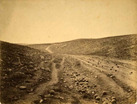
Due to the basic technology the subjects had to sit steady for long periods of time as the cameras could not capture movement without blur. The aims of staged scenes were to recreate real life war scenarios of the aftermath and the solders within the armies. I learnt this from: https://sluggerotoole.com/2010/11/07/roger-fenton-the-first-war-photographer-2/
Since the inception of war photography there have been many improvements to equipment, technology and techniques. In the 1850’s they had only one type of camera which was very expensive and much heavier than anything that exists nowadays. We have multiple types of cameras, lenses and accessories which produce a variety of images and styles.
Although many images are still commissioned for political reasons by sides involved in conflicts there are many photojournalists who document the reality and not for the glorification of war. They highlight the fact that it’s not only soldiers but also civilians who pay a heavy price. Images can be published online and be accessible anywhere in the world within minutes unlike the past where images may have been weeks or years old before there were published by the press.
Image 1:
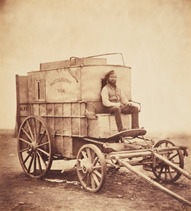
Roger Fenton, 1855 - The Crimea War
The portable darkroom with his assistant modelling.
This photograph was taken by setting up the cart with the portable darkroom within it with his assistant sat as still as he can for a period of time. I don’t think that he used the horse in this image as it would have been constantly moving causing motion blur.
This image is communicating how hard it was to be a photographer as all of the equipment was so heavy and of a large size so they used a cart to transport it all.
This image has an impact on me because it is showing how hard it was to be a photographer in 1850’s as you had to get the shot perfect each time because you only had a limited amount of shots you can use. I really like this photograph as it is showing where photography actually came from and where it war photography began.
Image 2:
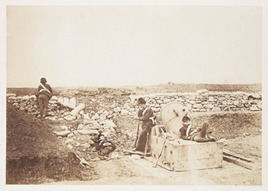
Roger Fenton, 1855 – The Crimea War
A British mortar battery during the siege of Sebastapol
The image its self looks very scratched and grainy which gives it the effect that is has been bombed and warn.
This image would have been taken over a period of 20 seconds, so the soldiers would have had to stay perfectly still so there wasn’t any motion blur.
Through this photograph it is showing “A Quiet Day in the Mortar Battery” as the photograph has been named. This communicates that they have busy days and some where they do nothing so they just relax all day but would always be ready for anything.
This photograph has impact on me as you can see a mortar blast from were an enemy mortar landed right next to the soldiers nearly hitting them. Just seeing them as relaxed is brave as they could be attached at any time.
Image 3:
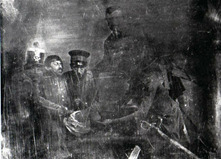
Unknown photographer, 1847 – Mexican American War
This image is really old image so it’s grainy and scratched with most of it undistinguishable on the right side due to the early date of the photograph which leaves a ghostly feeling within it.
This photograph looks like it was taken inside a building due to the ghosting of the object on the right side of the image which looks like a wooden post. This would have been a staged image as they are all looking towards the camera.
This photograph commutates the feeling that the soldiers are staring right at you through the image which intimidating you straight through the camera which makes you feel completely separate from them.
The impact of this image on the view is an honestly of the hardness of war and the human factor through it.
I really like this photograph for the fact of them starting right at you through the camera and how much it intimidates you.
Image 4:
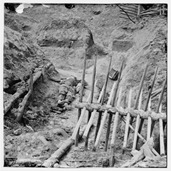
Thomas C.Roche, 1882 – Late War in Petersburg
“Dead Confederate Soldier, In trench beyond a section of chevaux-de-frise (Horse Barricades)”
This photograph is a very emotional due to the death of the two soldiers that are shown within the image with one shown in the main path and one of them are half buried with footprints on top of him.
This photograph would have been created after the war had moved on from that point and the aftermath had been left.
This photograph was one of the first shown images in a gallery of actual death within the photograph, so it would have been very emotional and shocking to see. This image also had a lot of impact on people because they actually got to see the proper aftermath of the war so they all realised what it was like to be there.
I really like this photograph as it is very sad and emotional to look at. However, the warness through the image from the dead bodies to the ground as there isn’t any grass within it and how all of the soil is crumbling.
Image 5:
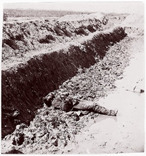
Thomas C.Roche, 1864 – American Civil War
“Dead Confederates, Fort Mahone”
This photograph is very grainy and looks a small bit over exposed so it is very bright and has less detail within the image. It is also quite emotional because of the body that is shown in the centre of the photograph.
This photograph would have been created when the war had finished and moved to a different place after one side had concord that part of the war field. Then the photographer would have gone in and shot images of the aftermath and death.
This photograph communicated and impacted the true honest brutality of war from the dead body shown and the desecration of the ground from everyone’s foot prints and bullets scattered everywhere.
To me this photograph is very inspiring as it is showing the truth behind war and not what people thought it was like. It shows the reality of the conditions and what the soldiers had to deal with and live in, but also shows how they aren’t very respectful with how they treat the body’s of fallen soldiers.
Part Two: The Bang Bang Club
The Bang Bang club was made up of four conflict photographers in towns of South Africa between 1990 and 1994. The name “The Bang Bang Club” was born out of an article that was published in South African magazine called “Living”. The people involved with this organisation were:
Kevin Carter
Greg Marinovich
Ken Oosterbroek
João Silva
They were trying to show the conflict and fighting between the ANC and IFP supporters, they were all trying to document the under reported conflict.
The Bang Bang Club existed in South Africa between 1990 and 1994 during the transition from the apartheid system to democracy. And through this small time period there was a lot of black on black factional violence particularly between ANC and IFP. The conflict occurred when the political motivations and beliefs of the two parties differed after they lifted the bans of both political parties. They were previously banned by the white controlling powers.
I know from my own knowledge that the black people of South Africa didn’t respect the white population due to how they were previously treated. This caused major tensions within the country as the black population tried to claim back what was rightfully theirs.
Equipment they used:
Nikon Nikkormat SLR, Nikon F2, Nikon FM2, Nikon F4, Leica M3, and a large format camera, Nikon F2, Nikon FM2, Nikon F4, Leica M3, and a large format camera
Image 1:
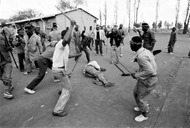
Greg Marinovich, 1990-1994
This photograph is very sad to look at as there is one person in the middle of everyone being beaten and sliced by knifes and machetes. It is a very hard photograph to look at as it isn’t something that should happen and never does normally happen.
This photograph was taken by the photographer from The Bang Bang Club called Greg Marinovich on the streets. He would have taken this with a 35mm film camera.
This image communicates the scale of how bad the fighting and the “almost war” reached. This photograph is showing what the locals would do to people who did not agree with their political views.
This will have impact on everyone who looks at this as they would want to try and help but would be scared to intervene.
I feel like this photograph is because they are targeting people who are defenceless and are without weapons. I am sad when I see this because it is showing a defenceless man getting attacked by a gang of people in the middle of the street.
Image 2:
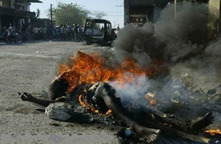
Kevin Carter, 1990-1994
This photograph is very very emotional and sad to look at as it is a man being burnt alive by having a tyre put around them full of petrol which slowly burns them alive (necklacing) and left out in the street for everyone to see.
This photograph was created with a 35mm film camera and the photographer got up close to the person sadly dead on the floor and everyone else in the background just standing there watching.
This communicates that no one has any power to stop what was happening. It is also representing that everyone is scared to do anything as they would have the same done to themselves .
This has a lot of impact on myself as it is showing torture of this man and how slow and painful his death would have been. Everyone should be sad and shocked to see this.
Image 3:
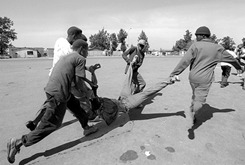
João Silva, 1990-1994
This photograph is showing four men carrying the dead body of a fallen man who would have either been shot or stabbed my someone. There is also a blood trail falling from the body onto the floor as they are carrying him.
This would have been shot on a 35mm Film Camera and the photographer would have been following the people around to get close to them. The photographer would of had to earn the trust of the people to be allowed to get this close.
This image is communicating that even though people are dying that everyone is still trying to clean up the streets of the bodies and take them home to their families. This also has a lot of impact on people because it is showing the true aspect of what is happening.
I feel like this image is very emotional to look at because it shows that there are good people out there trying to help in their own communities and country.
Image 4:
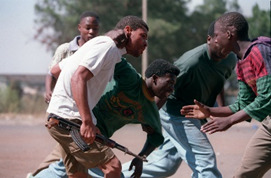
João Silva, 1994
This photograph is very powerful because it is showing the eastern suburbs of Johannesburg and is showing an injured young man being held up my other men with guns helping him get away.
This photograph was taken while they were scrambling for cover, the photographer would have been following a couple of men fighting for what they believe in. It would have been taken with a 35mm Film Camera.
The message of this photograph is to show how young everyone is that are fighting to get their way in the village that they live in. But also, to show the effect that it has on the people and their injuries. The impact of this could have been that people can see how much badly injured they can get but also how young the fighters are.
I feel strongly about this photograph as it is showing the reality of the situation. That people are always there to help each other on their own side.
Image 5:
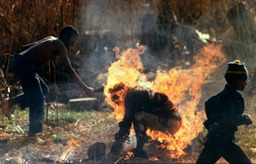
Greg Marinovich, 1990 and he won Pulitzer Prize in 1991 for Spot News Photography.
This image is showing a man who supports Zulu Inkatha being a burnt alive and clubbed to death by an African National Congress supporter. The child in the bottom right looks like he is trying to run away from that area as he doesn’t want to die and that he’s trying to get out of there with his life.
This would have been created by using a 35mm Film Camera and the photographer Greg Marinovich would have probably been walking along the streets to find this shot or in a car driving down each street looking for something that is happening.
This photograph is communicating the aggression they all have to each other and that they would do anything to kill the people who support the opposing political party. They would also try to do it in the most painful way that they could. What makes the impact of the image so great is that you could never imagine this happening in normal life.
I really like this photograph because it inspires me to do something to stop all of this and try and have peace in different countries in the world.
https://www.npr.org/2011/04/21/135513724/two-war-photographers-on-their-injuries-ethics
http://www.thebangbangclub.com/ken-oosterbroek.html
https://bakwamagazine.com/2015/06/16/the-bang-bang-club/
https://www.google.co.uk/search?q=The+bang+bang+club+photography&rlz=1C1AVNE_enGB671GB671&source=lnms&tbm=isch&sa=X&ved=0ahUKEwjFjIa5nbnXAhXEuBoKHbDmC8IQ_AUICigB&biw=958&bih=954#imgrc=LCQKJYLDNlyTnM:
https://en.wikipedia.org/wiki/History_of_South_Africa_(1994%E2%80%93present)
https://en.wikipedia.org/wiki/Bang-Bang_Club
https://en.wikipedia.org/wiki/War_photography
https://en.wikipedia.org/wiki/Roger_Fenton
http://time.com/3881577/crimea-where-war-photography-was-born/
0 notes
Text
Why an ex-cop who posed as an undercover heroin addict wants drugs decriminalized
For 14 years, Neil Woods risked his life as a drug squad police officer posing undercover as a heroin and crack addict.
As among the first of his kind in the UK, he helped to establish tactics and training to infiltrate the most notorious and violent drug gangs across the country. In over a decade, he had completed operations in areas including Derby, Leicester, Nottingham, Leeds and Brighton.
But despite his efforts, he gradually realised his work was only making the situation worse. Criminals were becoming more brutal as they wised up to police strategies. Drug-related deaths were climbing and drugs were becoming stronger and more readily available.
To Woods, the war on drugs had failed. Determined to undo the damage he'd done as an officer - which caused him to suffer from PTSD - he launched Law Enforcement Against Prohibitions (Leap) in the UK. Founded in the US, the organisation brings together former members of the criminal justice system, including ex-members of MI5 and the authorities in Afghanistan who have seen how the black market funds terrorism.
The Independent spoke to Woods about his most extreme experiences as a drug squad cop, and why he believes politicians need to decriminalise drugs.
How did you end up being an undercover cop? Was it something you always wanted to do?
The type of work I did didn't really exist when I started doing it in 1993 and there was a lot of pressure from Home Office for forces to deal with the latest moral outrage of crack cocaine. I was working with the drug squad in Derbyshire and I was asked to have a go at crack cocaine. It was successful and dictated the next 13 years of my life. This was before there was formal training and rules for undercover work. I helped to develop the training and the tactics that were rolled out three years later. I was just throw in at the deep end.
Was it tough starting out? Do you remember your first operation?
The first place I was posted was in Derby and it wasn't actually that difficult. There were some proper gangsters selling crack and heroin but they weren't used to the tactic so although it was a bit scary it wasn’t tremendously difficult because they weren't expecting it. But thing the about undercover work is that it doesn't take long for criminalise to learn the tactics.
So around two years later I was doing an operation in Fenton, Staffordshire, on a dealer I’d been buying heroin from for a few weeks. One day, he answered the door and held samurai sword to my throat and accused me of being part of the DS (drug squad). Spit was flying out of his mouth as he was growling and I could feel the cold steel on my throat and I thought that was it. I thought he would murder me. And I heard some female laughing from behind him and a woman stuck her head out from behind the door and said ‘I thought he was actually going to say he was DS for a second!’ I realised he was winding me up then. Maybe he wanted to try out his new sword. But as every year went on without fail the people were more violent. The ultimate defence against the development of police tactics is an increased use of violence to intimidate the community in which undercover police move. Also it’s the ultimate defence against police informants because the most successful gangsters are the ones who make people too scared to grass them up.
How did you pretend to be an heroin addict? Did you go to acting classes? Or cut down your diet to look scrawny?
Well the idea that addicts are thin is just part of the stigma of drug use. Problematic users come in all shapes and sizes. As for behaviour you have to know your commodity. You have to be a real geek with knowing how people behave and you have to know it even more than the people on the ground. Then it’s just the art of deception and staying attuned to the body language of other people and detecting the moment someone is lying. That can be the thing that saves your life.
When has the art of deception saved your life?
In 2001 - by that point I’d been doing it for about seven or eight years - I was in a six month operation and I got to know one gangster really well. But I had no footage of him corroborate the other evidence. He had been hiding out so I tempted him to a car park with a load of counterfeit clothing and he came with this massive block of crack cocaine the size of a videotape and two mates that I didn’t know. One of them was instantly suspicions of me and I was sort of fending off his suspicions with subtle verbal jousting to steer the questions away from me.
Eventually he started picking at my clothes. He pushed me against a wall and saw the camera I was hiding. This wasn’t James Bond. It wasn’t a sophisticated camera and there wasn't much doubt about what he’d found. What I did was launch a torrent of abuse at him about picking at my clothes and I started moving really slowly. If you run away from a pack of wolves they catch you and eat you but if you stare at them in the eye and leave in a bold fashion you can confuse them for long enough to escape.
I was so bold and slow and un-bothered that he gave me time to walk away. I managed to get away all the time he was shouting to his mates “he’s heat! He’s f*cking five O!’ And the dealer said ‘nah he’s fine'. I almost got to the end of the carpark. Almost. But then I heard running behind me and I thought 'this is it'. It was the guy cutting up the crack and he comes up to me and says ‘nevermind my mate. He's a dickhead’. And I go along with it and say ‘these aren't even my clothes. I borrowed them this morning’. And then he gave me a rock of crack and I carried on walking. His mate was still screaming ‘mate he’s five O!’ Eventually, his mate must have convinced him i was from the police because when I got to the end of the carpark I heard screeching tyres.
I ran onto the pavement and could hear it zooming behind me, getting closer. Luckily I get to some railings but I must have been a metre away from being run down by the car. I got back to a safe location and was debriefed by the special operations team and gave descriptions of the people and registration of the car. An intelligence guy told me ‘I don't know why they didn't shoot you.There's loads of intel that there’s a gun in the car!’ They probably thought they could get me in the car and I was too close to civilisation. I was lucky. Lots of times I was lucky.
When else was your life in danger like that?
There are so many instance! Once I was doing a long term job in a pub run by outrageous almost cartoon-like gangsters who were organised car thieves and the main guy was a coke and crack dealer. The mistake I made was making myself out to be a connoisseur of amphetamines which I’m obviously not. I meet this guy and he tells me he’s brought me a present. It’s a bag filled with pink toxic goo that was dissolving the plastic bag it was in. He said ‘I bet you've never had anything like this before'. Just before this, he’d ordered someone to be beaten and he'd been dragged out bloody and bruised. This guy was a maniac. He picked up on my hesitation instantly and became suspicious. So I had to try some of it or I’d be in trouble. So I tried it and he said ‘no, you want more than that’.
So I took a big lump. And I could almost feel the mouth ulcers forming in my mouth. It turned out whereas street amphetamines are between 5 to 7 per cent pure, this was 40 per cent pure. It was horrific. I felt this warmth in my stomach and I was out of it. I had the most horrendous intense anxious feeling. I didn't sleep for three nights. Mind you my house has never been so clean.
You have a wife and children - what was it like for them?
Well I didn't have the best relationship with my wife at the time but I still took kids swimming on a Sunday. I’d be away two or three nights a week and travelling but on weekends I was with the kids. But I couldn't tell friends or colleagues what my job was. Even the officers I worked with didn’t know what my real name was because I would be managed by a special operations unit.
Has anyone ever recognised you? Aren’t you afraid someone will seek revenge now you've gone public with your story?
There is always that risk but I worked some distance away from home. I’ve only been back to Brighton once and Northampton once very briefly. I don’t try to avoid places although I suppose I won’t be hanging around estates in Leicester anytime soon. That could be fairly risky. But I used used to risk my life doing the work because I used to believe I was doing good. Now I realise everything I did only caused harm.
Now, I feel duty bound to continue taking risks because it’s a matter of principal. And I wouldn’t expect anyone to seek revenge because organised drug dealing is a business and these people use violence as part of the business model. They use violence against their own communities to protect themselves from being arrested and grassed up. This is caused by policing drugs so to come after me for revenge doesn't fit into this model.
What is the biggest misconception people have about drugs and drug laws?
When I went into policing I thought addicts had made the mistake of trying drugs and had no willpower to stop. Actually, problematic drug users - or at least all the ones I knew - were self medicating. Most of the heroin users I knew were self-medicating for childhood trauma, whether physical or sexual. As an undercover officer I spent a great deal of time getting to know these people. The more I knew someone the more I could manipulate them. They’re like puppets. And they trusted me and saw me as a peer.
There was a young lady I met in Northampton who went by the street name Uma. She explained to me she sometimes came off heroin to bring down her tolerance but that she became suicidal because she remembered the abuse she received from her uncle. Heroin is a very powerful painkiller of the body but also the mind. To the law, she’s a criminal to the law and I as an agent of the state was there to capture people like that. But they were caught in the crossfire between the police and gangs. She quite clearly needed help. If people were prescribed heroin they would be rescued from sexual exploitation. These people are slaves to drug dealers.
When did you decide that the war on drugs was futile?
I knew that I couldn’t win early on. But I kept being tempted back into it because I was good at my job. The police departments would say ‘Woodsy, we need you. These gangsters are even nastier that the other ones. They’re burning people to death. They’re using rape as a weapon. But in Brighton they had been overusing the tactic and in very unimaginative ways. And groups were very savvy and had created perfect defences.
They used homeless people as a point of contact and they instructed them ‘you are now our dealer and if you bring anyone within view of us you will be killed and we’ll find someone else’. At the time there was the highest drugs deaths in the city per capita in the country. And homeless people were dying from overdoses. I can’t say that those overdoses were deliberate but everyone on the streets was convinced that they were. But police reports just showed up as an overdose - and what cop cares about that?
And it was because of me that organised crime was getting nasty. I was developing the tactics. I put dealers in prison for over 1000 years and I only disrupted the heroin supply for two hours. Policing can’t affect the demand so policing drugs is completely futile. I can’t emphasise that enough. More people die and it gets more violent. Drugs have got stronger and cheaper and more varied since the Misuse of Drugs Act 1971.
If criminalising drug users isn’t the answer - what is?
The answer is to regulate drugs and take the power away from organised crime. The illicit drugs market is worth £7billion a year. Our communities are ruined by organised crime intimidating populations to protect themselves so we need to regulate the drug supply like we do with alcohol.
All drugs can be harmful but cannabis is the most to young people, so we need to protect them from it. Gangsters are almost all recruited through the market because it’s where our teenagers first come into contact with organised crime. I saw one young man in an inner city go from a cheeky 17-year-old who was quite likeable to a terrifying 18-year-old in six months. He had to learn from his new team of buddies that if you want to survive you have to be completely vicious so people are scared of you. The drug market is shaping the personalities of our young men. We can only stop this by regulating drugs.
Which countries can we learn from?
I don’t advocate a free for all. In Switzerland they brought in Heroin Assisted Treatment in the 1990s. Heroin users set their dosage and receive counselling. Eventually the users decrease their dosage. And they now have less shoplifting and almost no street prostitution. And deaths from MDMA deaths are so rare because they have labs where people can test their drugs. Canada is about to regulate the market right across the country and the interesting thing is that the winning Liberal Party campaigned to regulate cannabis to protect children from crime. They won while campaigning for that. Portugal has a progressive drug policy and they have a fraction of drug deaths compared to other countries.
What do you want to see in the UK?
The most urgent is heroin assisted treatment to save lives and bring down crime. The net cast by crime and the health costs is huge. Prescribing heroin will undermine the power of organised criminals and reduce exploitation. We should regulate the cannabis market to protect our young people - this is a child protection issue. The third thing is to have organised drug testing along the lines of the Loop so we save lives of young people.
SEE ALSO: How to spot an undercover cop
Join the conversation about this story »
NOW WATCH: Animated map of what Earth would look like if all the ice melted
from All About Law http://www.businessinsider.com/why-an-ex-cop-who-went-undercover-as-addict-wants-drugs-decriminalized-2017-5
0 notes
Text
Why an ex-cop who posed as an undercover heroin addict wants drugs decriminalized
For 14 years, Neil Woods risked his life as a drug squad police officer posing undercover as a heroin and crack addict.
As among the first of his kind in the UK, he helped to establish tactics and training to infiltrate the most notorious and violent drug gangs across the country. In over a decade, he had completed operations in areas including Derby, Leicester, Nottingham, Leeds and Brighton.
But despite his efforts, he gradually realised his work was only making the situation worse. Criminals were becoming more brutal as they wised up to police strategies. Drug-related deaths were climbing and drugs were becoming stronger and more readily available.
To Woods, the war on drugs had failed. Determined to undo the damage he’d done as an officer – which caused him to suffer from PTSD – he launched Law Enforcement Against Prohibitions (Leap) in the UK. Founded in the US, the organisation brings together former members of the criminal justice system, including ex-members of MI5 and the authorities in Afghanistan who have seen how the black market funds terrorism.
The Independent spoke to Woods about his most extreme experiences as a drug squad cop, and why he believes politicians need to decriminalise drugs.
How did you end up being an undercover cop? Was it something you always wanted to do?
The type of work I did didn’t really exist when I started doing it in 1993 and there was a lot of pressure from Home Office for forces to deal with the latest moral outrage of crack cocaine. I was working with the drug squad in Derbyshire and I was asked to have a go at crack cocaine. It was successful and dictated the next 13 years of my life. This was before there was formal training and rules for undercover work. I helped to develop the training and the tactics that were rolled out three years later. I was just throw in at the deep end.
Was it tough starting out? Do you remember your first operation?
The first place I was posted was in Derby and it wasn’t actually that difficult. There were some proper gangsters selling crack and heroin but they weren’t used to the tactic so although it was a bit scary it wasn’t tremendously difficult because they weren’t expecting it. But thing the about undercover work is that it doesn’t take long for criminalise to learn the tactics.
So around two years later I was doing an operation in Fenton, Staffordshire, on a dealer I’d been buying heroin from for a few weeks. One day, he answered the door and held samurai sword to my throat and accused me of being part of the DS (drug squad). Spit was flying out of his mouth as he was growling and I could feel the cold steel on my throat and I thought that was it. I thought he would murder me. And I heard some female laughing from behind him and a woman stuck her head out from behind the door and said ‘I thought he was actually going to say he was DS for a second!’ I realised he was winding me up then. Maybe he wanted to try out his new sword. But as every year went on without fail the people were more violent. The ultimate defence against the development of police tactics is an increased use of violence to intimidate the community in which undercover police move. Also it’s the ultimate defence against police informants because the most successful gangsters are the ones who make people too scared to grass them up.
How did you pretend to be an heroin addict? Did you go to acting classes? Or cut down your diet to look scrawny?
Well the idea that addicts are thin is just part of the stigma of drug use. Problematic users come in all shapes and sizes. As for behaviour you have to know your commodity. You have to be a real geek with knowing how people behave and you have to know it even more than the people on the ground. Then it’s just the art of deception and staying attuned to the body language of other people and detecting the moment someone is lying. That can be the thing that saves your life.
When has the art of deception saved your life?
In 2001 – by that point I’d been doing it for about seven or eight years – I was in a six month operation and I got to know one gangster really well. But I had no footage of him corroborate the other evidence. He had been hiding out so I tempted him to a car park with a load of counterfeit clothing and he came with this massive block of crack cocaine the size of a videotape and two mates that I didn’t know. One of them was instantly suspicions of me and I was sort of fending off his suspicions with subtle verbal jousting to steer the questions away from me.
Eventually he started picking at my clothes. He pushed me against a wall and saw the camera I was hiding. This wasn’t James Bond. It wasn’t a sophisticated camera and there wasn’t much doubt about what he’d found. What I did was launch a torrent of abuse at him about picking at my clothes and I started moving really slowly. If you run away from a pack of wolves they catch you and eat you but if you stare at them in the eye and leave in a bold fashion you can confuse them for long enough to escape.
I was so bold and slow and un-bothered that he gave me time to walk away. I managed to get away all the time he was shouting to his mates “he’s heat! He’s f*cking five O!’ And the dealer said ‘nah he’s fine’. I almost got to the end of the carpark. Almost. But then I heard running behind me and I thought ‘this is it’. It was the guy cutting up the crack and he comes up to me and says ‘nevermind my mate. He’s a dickhead’. And I go along with it and say ‘these aren’t even my clothes. I borrowed them this morning’. And then he gave me a rock of crack and I carried on walking. His mate was still screaming ‘mate he’s five O!’ Eventually, his mate must have convinced him i was from the police because when I got to the end of the carpark I heard screeching tyres.
I ran onto the pavement and could hear it zooming behind me, getting closer. Luckily I get to some railings but I must have been a metre away from being run down by the car. I got back to a safe location and was debriefed by the special operations team and gave descriptions of the people and registration of the car. An intelligence guy told me ‘I don’t know why they didn’t shoot you.There’s loads of intel that there’s a gun in the car!’ They probably thought they could get me in the car and I was too close to civilisation. I was lucky. Lots of times I was lucky.
When else was your life in danger like that?
There are so many instance! Once I was doing a long term job in a pub run by outrageous almost cartoon-like gangsters who were organised car thieves and the main guy was a coke and crack dealer. The mistake I made was making myself out to be a connoisseur of amphetamines which I’m obviously not. I meet this guy and he tells me he’s brought me a present. It’s a bag filled with pink toxic goo that was dissolving the plastic bag it was in. He said ‘I bet you’ve never had anything like this before’. Just before this, he’d ordered someone to be beaten and he’d been dragged out bloody and bruised. This guy was a maniac. He picked up on my hesitation instantly and became suspicious. So I had to try some of it or I’d be in trouble. So I tried it and he said ‘no, you want more than that’.
So I took a big lump. And I could almost feel the mouth ulcers forming in my mouth. It turned out whereas street amphetamines are between 5 to 7 per cent pure, this was 40 per cent pure. It was horrific. I felt this warmth in my stomach and I was out of it. I had the most horrendous intense anxious feeling. I didn’t sleep for three nights. Mind you my house has never been so clean.
You have a wife and children – what was it like for them?
Well I didn’t have the best relationship with my wife at the time but I still took kids swimming on a Sunday. I’d be away two or three nights a week and travelling but on weekends I was with the kids. But I couldn’t tell friends or colleagues what my job was. Even the officers I worked with didn’t know what my real name was because I would be managed by a special operations unit.
Has anyone ever recognised you? Aren’t you afraid someone will seek revenge now you’ve gone public with your story?
There is always that risk but I worked some distance away from home. I’ve only been back to Brighton once and Northampton once very briefly. I don’t try to avoid places although I suppose I won’t be hanging around estates in Leicester anytime soon. That could be fairly risky. But I used used to risk my life doing the work because I used to believe I was doing good. Now I realise everything I did only caused harm.
Now, I feel duty bound to continue taking risks because it’s a matter of principal. And I wouldn’t expect anyone to seek revenge because organised drug dealing is a business and these people use violence as part of the business model. They use violence against their own communities to protect themselves from being arrested and grassed up. This is caused by policing drugs so to come after me for revenge doesn’t fit into this model.
What is the biggest misconception people have about drugs and drug laws?
When I went into policing I thought addicts had made the mistake of trying drugs and had no willpower to stop. Actually, problematic drug users – or at least all the ones I knew – were self medicating. Most of the heroin users I knew were self-medicating for childhood trauma, whether physical or sexual. As an undercover officer I spent a great deal of time getting to know these people. The more I knew someone the more I could manipulate them. They’re like puppets. And they trusted me and saw me as a peer.
There was a young lady I met in Northampton who went by the street name Uma. She explained to me she sometimes came off heroin to bring down her tolerance but that she became suicidal because she remembered the abuse she received from her uncle. Heroin is a very powerful painkiller of the body but also the mind. To the law, she’s a criminal to the law and I as an agent of the state was there to capture people like that. But they were caught in the crossfire between the police and gangs. She quite clearly needed help. If people were prescribed heroin they would be rescued from sexual exploitation. These people are slaves to drug dealers.
When did you decide that the war on drugs was futile?
I knew that I couldn’t win early on. But I kept being tempted back into it because I was good at my job. The police departments would say ‘Woodsy, we need you. These gangsters are even nastier that the other ones. They’re burning people to death. They’re using rape as a weapon. But in Brighton they had been overusing the tactic and in very unimaginative ways. And groups were very savvy and had created perfect defences.
They used homeless people as a point of contact and they instructed them ‘you are now our dealer and if you bring anyone within view of us you will be killed and we’ll find someone else’. At the time there was the highest drugs deaths in the city per capita in the country. And homeless people were dying from overdoses. I can’t say that those overdoses were deliberate but everyone on the streets was convinced that they were. But police reports just showed up as an overdose – and what cop cares about that?
And it was because of me that organised crime was getting nasty. I was developing the tactics. I put dealers in prison for over 1000 years and I only disrupted the heroin supply for two hours. Policing can’t affect the demand so policing drugs is completely futile. I can’t emphasise that enough. More people die and it gets more violent. Drugs have got stronger and cheaper and more varied since the Misuse of Drugs Act 1971.
If criminalising drug users isn’t the answer – what is?
The answer is to regulate drugs and take the power away from organised crime. The illicit drugs market is worth £7billion a year. Our communities are ruined by organised crime intimidating populations to protect themselves so we need to regulate the drug supply like we do with alcohol.
All drugs can be harmful but cannabis is the most to young people, so we need to protect them from it. Gangsters are almost all recruited through the market because it’s where our teenagers first come into contact with organised crime. I saw one young man in an inner city go from a cheeky 17-year-old who was quite likeable to a terrifying 18-year-old in six months. He had to learn from his new team of buddies that if you want to survive you have to be completely vicious so people are scared of you. The drug market is shaping the personalities of our young men. We can only stop this by regulating drugs.
Which countries can we learn from?
I don’t advocate a free for all. In Switzerland they brought in Heroin Assisted Treatment in the 1990s. Heroin users set their dosage and receive counselling. Eventually the users decrease their dosage. And they now have less shoplifting and almost no street prostitution. And deaths from MDMA deaths are so rare because they have labs where people can test their drugs. Canada is about to regulate the market right across the country and the interesting thing is that the winning Liberal Party campaigned to regulate cannabis to protect children from crime. They won while campaigning for that. Portugal has a progressive drug policy and they have a fraction of drug deaths compared to other countries.
What do you want to see in the UK?
The most urgent is heroin assisted treatment to save lives and bring down crime. The net cast by crime and the health costs is huge. Prescribing heroin will undermine the power of organised criminals and reduce exploitation. We should regulate the cannabis market to protect our young people – this is a child protection issue. The third thing is to have organised drug testing along the lines of the Loop so we save lives of young people.
SEE ALSO: How to spot an undercover cop
Join the conversation about this story »
NOW WATCH: Animated map of what Earth would look like if all the ice melted
0 notes